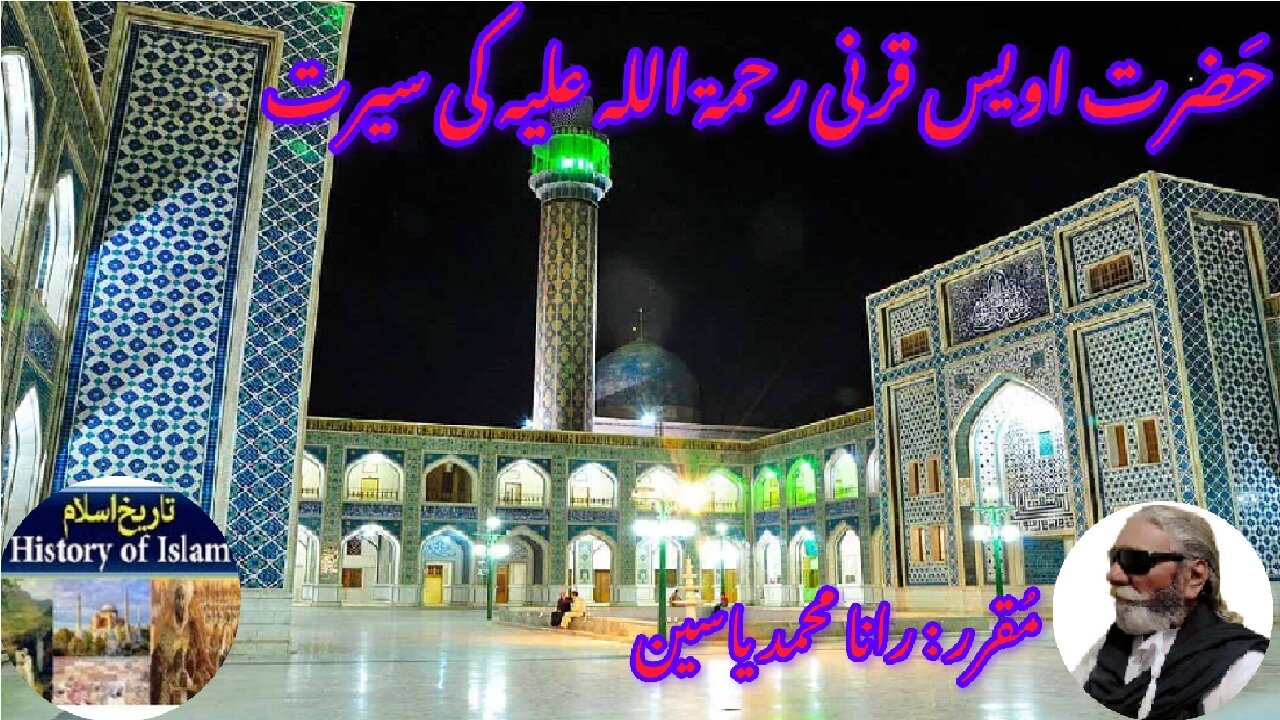Premium Only Content

Hazrat Owais-al-Qarni and his shrine | ओवैस-अल-क़रनी | حضرت اویس القرنی کی سیرت اور مزار کی تاریخ
@islamichistory813 #owaisalqarani #owaisqarani #sufisaint #cultural #heritage #biography #islamicmysticism #islamicphilosophy #shrine #historical #figures
Biography of Owais al-Qarani and the history of his shrine
Dekhti Aankhooon aur sountay kaanoon ko Asslamoalaikum, sisters, brothers friends and elders, in informative series videos of Islamic ascolars, sufisaints, cultural heritages, islamic philosophys, islamic mysticisms and historical figures. today we are describing biography of Owais al-Qarani and the history of his shrine.
Owais al-Qarani, also known as Uways or Owais, is a revered figure in Islamic history, particularly within the Sufi tradition. He was a Muslim from South Arabia, specifically from the village of Qarn in Yemen, and lived during the time of the Prophet Muhammad (PBUH). Despite living in the same era as the Prophet, Owais al-Qarani never physically met Muhammad (PBUH). His story, however, holds profound spiritual significance, and he is honored by Muslims around the world, particularly for his unique position in Islamic history. Although he was not a direct companion of the Prophet, Owais is honorarily included among the Companions (Sahabah) because of the remarkable qualities that set him apart and his deep spiritual connection with the Prophet, despite the physical distance.
Owais al-Qarani's story is one of devotion, sacrifice, and humility. He was a man of great piety and religious devotion, known for his profound love for the Prophet Muhammad (PBUH), even though they never had the opportunity to meet in person. Owais had heard of Muhammad’s teachings and was deeply inspired by them. However, he faced the challenge of being far from the Prophet’s city, Medina, and being unable to travel due to his responsibility of caring for his sick mother. His mother’s condition was severe, and out of his deep love and sense of duty toward her, Owais chose to remain with her, prioritizing her care over meeting the Prophet Muhammad (PBUH). This selflessness and devotion to his mother earned him a special place in Islamic tradition, as it highlighted his commitment to both his faith and his filial duties.
The Prophet Muhammad (PBUH), aware of Owais’s sacrifice, spoke highly of him on several occasions, praising his sincerity, righteousness, and unwavering devotion to God. In one famous narration, the Prophet Muhammad (PBUH) mentioned Owais to his companions, saying that there would be a man named Owais from Yemen who would possess an extraordinary quality of sincerity and devotion, and that if anyone were to meet him, they should ask him to pray for them. The Prophet Muhammad (PBUH) told his companions that Owais had a pure heart and that he would be one of the special people in Paradise. Although he never met the Prophet physically, Owais was granted this honor through his devotion, his sacrifice, and the purity of his heart.
Owais al-Qarani’s reputation as a man of exceptional character and deep spirituality spread far and wide. His story serves as an inspiring example of piety, selflessness, and devotion to God and family. Owais's love for the Prophet Muhammad (PBUH) transcended the physical distance between them, and this pure, unshakeable bond with the Prophet made him a significant figure in Islamic spirituality. His life also emphasizes the importance of spiritual qualities over mere physical proximity to the Prophet. It is said that the Prophet Muhammad (PBUH) spoke of Owais’s qualities in such a way that he became one of the most admired figures in early Islamic history, despite never having directly interacted with him.
After the death of the Prophet Muhammad (PBUH), Owais continued to live a life dedicated to serving others and practicing piety. He is said to have made the pilgrimage to Medina at some point, where he met the companions of the Prophet, such as Umar ibn al-Khattab, who recognized his deep spiritual status. Owais was known to have remained a humble and modest figure, despite the high regard in which he was held. His spiritual wisdom and dedication to helping others through his prayers and actions made him beloved by those who knew him, even though he lived a relatively quiet and unassuming life.
The legacy of Owais al-Qarani is celebrated not just through his story, but also through the veneration of his shrine, which is located in the village of Qarn in Yemen. His shrine has become a significant pilgrimage site for those who wish to pay their respects to this unique and revered figure. The site attracts visitors from all around the world, particularly from the Muslim community, who come to honor Owais’s memory and reflect on his deep spirituality. Although the shrine has faced challenges over the years, particularly due to political and social instability in the region, it remains an important symbol of devotion, humility, and spiritual connection to God and the Prophet Muhammad (PBUH).
Owais al-Qarani’s shrine is not just a physical place of pilgrimage but also a symbol of the eternal connection between the devotee and the Prophet, despite the barriers of time and space. His legacy teaches Muslims the importance of sincerity in worship, the significance of personal sacrifice, and the profound impact of having a pure heart. Owais’s life is a reminder that true closeness to the Prophet Muhammad (PBUH) is not necessarily defined by physical proximity, but by the depth of one’s love, devotion, and commitment to living a life of faith and compassion.
In conclusion, Owais al-Qarani’s life and legacy continue to inspire Muslims around the world. His devotion to the Prophet Muhammad (PBUH), his sacrifice for his mother, and his unwavering faith make him a model of spiritual excellence. The shrine in his honor serves as a place of reflection, prayer, and connection, where Muslims can honor his memory and seek to emulate his virtues. Owais al-Qarani remains a cherished figure in Islamic history, a symbol of love, humility, and spiritual purity, whose influence continues to resonate across generations.
With this, we seek your permission until tomorrow, tomorrow we will describe the biography of Sayyid Ali Tirmizi and the history of his Shrine.
========================
-
 5:40
5:40
ISLAMIC HISTORY
1 day agoScholar Dr. Tahira Qutubuddin doctor taaharah qatb aldin سکالر ڈاکٹر طاہرہ قطب الدین
4 -
 LIVE
LIVE
a12cat34dog
3 hours agoTHIS GAME IS AMAZING :: METAL GEAR SOLID Δ: SNAKE EATER :: THEY CAN'T SEE US {18+}
73 watching -
 LIVE
LIVE
RamrodJenkins
3 hours agoI'm back! Gears of War time!
46 watching -
 17:08
17:08
Exploring With Nug
1 day ago $1.38 earnedMassive Thunderstorm Hits During Search for Missing Georgia Woman!
12.5K1 -
 LIVE
LIVE
GritsGG
9 hours agoRumble Customs! 3515 Ws! 🫡!
106 watching -
 LIVE
LIVE
ManoloCalifas
1 hour ago🔴 LIVE - DARK SOULS III SEAMLESS CO-OP
8 watching -
 21:20
21:20
AndresRestart
3 hours ago $0.27 earnedNintendo's GENIUS Mario & Zelda 40th Anniversary Plan!?
6.25K2 -
 LIVE
LIVE
SavageJayGatsby
4 hours agoSpicy Saturday | Let's Play: Baldur's Gate 3 | $300 Spicy Bite Goal | Mallymouse and Gwenifred
97 watching -
 1:00:04
1:00:04
Sgt Wilky Plays
2 hours agoRumble Gaming Bad Company Presents WARZONEPALOOZA
14.3K1 -
![Devin Nunes - Devin Nunes Reveals The Document The [DS] Was Looking For Was Hidden,Truth Is Coming](https://1a-1791.com/video/fww1/20/s8/1/-/e/L/d/-eLdz.0kob-small-Devin-Nunes-Devin-Nunes-Rev.jpg) 1:17:44
1:17:44
X22 Report
9 hours agoDevin Nunes - Devin Nunes Reveals The Document The [DS] Was Looking For Was Hidden,Truth Is Coming
122K124